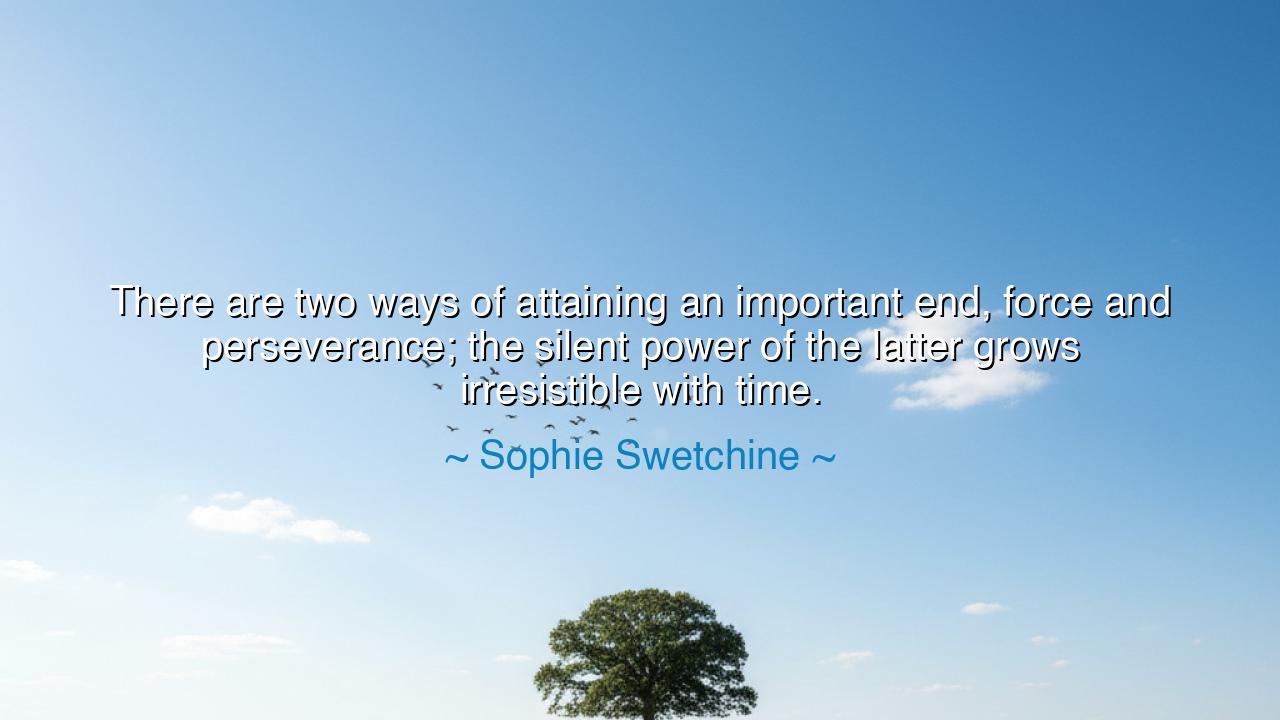
There are two ways of attaining an important end, force and
There are two ways of attaining an important end, force and perseverance; the silent power of the latter grows irresistible with time.






Sophie Swetchine, the saintly thinker of exile, once spoke with the voice of eternity when she declared: “There are two ways of attaining an important end, force and perseverance; the silent power of the latter grows irresistible with time.” In these words she sets before us two paths by which men strive for their goals: the violent rush of force, and the steady, unyielding march of perseverance. The one shouts and conquers for a season; the other whispers and endures, until even mountains bow before it.
The heart of her teaching lies in the nature of power. Force is loud, immediate, and often destructive; it achieves by breaking. But perseverance is quiet, patient, and creative; it achieves by outlasting. Swetchine reveals that though force may seem swifter, it is perseverance that holds dominion in the long arc of time. For wars may win kingdoms in a day, but perseverance builds civilizations that endure for centuries.
History speaks clearly. Consider the American civil rights movement. Many believed only violent upheaval could topple segregation. Yet Martin Luther King, Jr., armed not with swords but with patience, faith, and unyielding marches, proved Swetchine’s wisdom. His perseverance, though beaten, jailed, and mocked, grew stronger with each passing year. At last it broke chains that force could never have sundered without plunging the nation into chaos. His triumph was the triumph of time allied with steadfastness.
So too in the life of Mahatma Gandhi. Against the massive machinery of the British Empire, he did not summon armies or cannons. Instead, he wielded the silent power of perseverance—fasts, boycotts, and nonviolent resistance. At first mocked as weakness, it grew into an irresistible force that shook the empire to its core. What seemed fragile became unbreakable, for the power of perseverance does not fade; it multiplies with time.
O children of tomorrow, learn this eternal lesson: force may dazzle, but it is perseverance that conquers. The river, soft and yielding, wears away stone; the seed, buried and unseen, splits the earth to grow into a mighty tree. So it is with your life: choose not the fury of force, but the quiet strength that endures. For in time, the silent power of perseverance will prove irresistible, and the end you seek will surely be attained.






LVHiep Le van
Sophie Swetchine’s idea of the silent power of perseverance is really thought-provoking. It makes me think about how many times we underestimate the quiet, continuous work behind successful outcomes. Force might get attention quickly, but over time, perseverance builds something much more sustainable. But are there scenarios where force could actually be a more effective approach? In some cases, can immediate action and force be the key to unlocking long-term success?
KNKhanh Ngan
This quote really speaks to me about the power of patience. Often, people want quick results and use force to achieve them, but it’s the quiet, steady effort that builds something lasting. I do wonder though, is there ever a time when perseverance isn't enough? Can it sometimes be frustrating when slow progress feels like it's not leading to the desired end, or does that feeling just mean we need more time to allow perseverance to work?
HHVu Thi Hong Hanh
I love the idea that perseverance, when combined with time, becomes an unstoppable power. It’s a subtle but strong message about the quiet strength of those who don’t rush to make an impact. But it makes me wonder—what about situations where time is of the essence? If something requires urgent action, does perseverance alone hold the same power, or is force necessary in those cases to bring about change?
HTHang Thu
This quote makes me reflect on the value of perseverance. It’s true that, over time, consistent effort can build up to an unstoppable force. But is there a danger in relying too heavily on perseverance? Sometimes, the process can feel slow and frustrating, and it's tempting to take shortcuts with force. How do we know when it’s time to switch from perseverance to a more forceful approach, if at all?
DCLe Thi Dieu Chi
I find this quote really insightful. It makes me think about the power of persistence versus the immediate impact of force. Often, we see people trying to achieve things quickly, using forceful methods, but it’s the ones who quietly persist over time that tend to leave the most lasting impression. Do you think this idea holds true in every situation, or are there times when force is necessary to push through challenges?